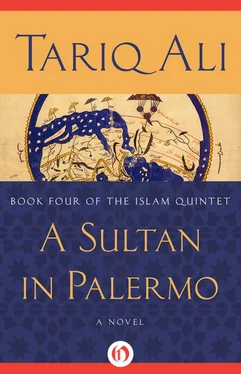Idrisi was thinking of al-Andalus, fragmented, under permanent siege and possibly on the edge of extinction. Siqilliya was different. Here it was not yet over and like many of his co-religionists, he believed that the Hauteville clan, for reasons of self-preservation, might aid the restoration of the old order. The first serious doubt had been raised by the Sultan’s decision to sacrifice Philip.
‘Most respected sir, we have reached Siracusa.’ The commander of the vessel was ready to lead him to the waiting boat sent by the Amir to row him to shore. Idrisi turned around and saw the row of lit torches on the shore. From the ship they appeared to be pallbearers, but he knew their presence signified that a person of importance had been sent to greet him.
As he disembarked, he was astounded to see the Amir waiting for him. The two men embraced. The Amir was dressed in a yellow silk tunic embroidered with gold thread, his trimmed hair and short beard dyed a darkish henna red went well with the tunic. He had a dour look. His eyes were dark, but deep-set, emphasising the corpse-like pallor of his countenance. The splendour of his garments could not conceal features that were not flawless and, even though he was some years younger than Idrisi, he had a stoop and walked with a slight limp. Nonetheless, the Amir had the air of a holy man, serious and penitent.
‘Allah be praised for bringing you here safely, Ibn Muhammad. Welcome to Siracusa. I believe the last time you visited us was on your way to Noto, but I was in Palermo at the time. Our families are, of course, acquainted with each other. It is an honour to meet you in person.’
News of his arrival had spread through the town. As the two mounted men followed the winding street to the large square, a throng of onlookers made a path for them. The bystanders accompanied them with rapid steps to the palace gate and began to chant ‘Wa Salaam, Ibn Muhammad al-Idrisi, Wa Salaam Amir al Siracusa,’ ‘Allah Akbar’. A few young men bravely shouted ‘Death to the infidels’, before being silenced by their elders and hurried away from the square.
A lavish banquet had been prepared in his honour to which all the local notables had been invited. The Amir had left Idrisi to recover from his journey in the hammam. After a warm and a cold bath, followed by an invigorating massage carried out by two palace giants, Idrisi felt refreshed but still disliked the thought of a formal banquet. There was, of course, the novelty. He did not really know the city and he remembered Ibn Fityan’s injunction. He would listen closely to what was said, but why should anything be said at a public meal? When would Mayya and Elinore arrive? Would they come here or go first to the family village, an hour away and not easily accessible? A knock on the door announced the palace steward who had arrived to escort him to the courtyard where the guests were assembled.
The Amir had discarded his listlessness and even the stoop seemed to have disappeared. With an unflinching gaze, he introduced Idrisi to the fifty or so men who, like carefully planted trees, stood in a straight line. Most of them were aged oaks, but towards the end of the row he observed two young men of chivalrous and attractive mien, who, defying convention, were deep in animated conversation, but fell silent at his approach. Each placed his right hand on his heart, bowed slightly and introduced himself in turn.
‘Abu Khalid.’
‘Abu Ali.’
Idrisi was stunned. They were his sons-in-law and must have been invited as a courtesy by the Amir. He embraced them warmly and whispered, ‘I am happy to see you. We will speak on our own tomorrow.’
As they were being seated, Idrisi was struck by something odd: no Bishops or monks were present. As far as he could tell there was not a single Nazarene at the table. He could not recall having ever sat at an official banquet without the presence of a prince of the Church or a monk. True, the Amir was a Believer and the palace was without a chapel, but there was no shortage of Bishops or Barons in the region. Idrisi wondered whether this had been a wise decision. The answer came soon enough.
‘I have noticed your inquiring looks, Ibn Muhammad,’ began the Amir in a barely audible voice. ‘This is an unusual gathering and not intended for many who are normally invited to the palace. I thought we would take advantage of your presence to invite a few chosen men who are filled with foreboding at the news that reaches us from Palermo. You appear surprised? Let me assure you that this is the first mehfil to meet at the palace. Usually some of us gather in the mosque after Friday prayers to discuss matters of common interest. But, as you know, some of our guests have travelled a long distance to be with us. You are amongst trusted friends. What you say will not be repeated.’
Idrisi felt trapped. He knew perfectly well that everything he said would be repeated in the tiniest villages in the region and by the time his words reached Noto, their meaning would be distorted beyond reason. He knew he must take great care.
‘Friends, I am touched by your trust and honoured by your presence, but what I am about to say is no different from what I have said on many occasions to the Sultan himself. And I will be happy to answer your questions provided that I know the answers. I assume you have heard the news regarding Philip.’
All nodded sadly. Idrisi did not reveal the discussion that had taken place with Philip in the darkened room of the Ayn al-Shifa Mosque in Palermo, but he told them as much as he could without implicating anyone apart from himself. He talked of the loyalty that Philip had always demonstrated to the Sultan, of his administrative skills and how he had done his utmost to prevent injustices on the island. Even though he had not always succeeded, the Barons and other land-thieves saw him as an enemy, an obstacle that had to be removed if their cause was to triumph in the Two Kingdoms.
They heard him in silence.
It was the Amir who raised the first question. ‘They will try him, find him guilty and burn him. And we are to watch this powerless and without making any attempt to save him.’
Idrisi responded: ‘That is what he desires. He feels anything else would be regarded as a provocation and could unleash a bloodbath throughout the island, especially where we are still strong as in Siracusa and Noto.’
Next Abu Khalid spoke. ‘Respected Abu Walid, not a single day passes without our land being transferred to their Church or the Barons. Even here, where you say we are strong, our people have become slaves. We are forced to work for them on the land and kill and die for them in the Sultan’s armies. They don’t trust us at all. That is why they bring the barbarians from the North to oppress us. Lombards they call them. These rude animals helped to destroy the great empire of the Romans. Now they adorn themselves with wooden crosses around their necks, but their heads remain empty. Anything the monks tell them is impure they kill. They dishonour our women and subject our men to unbearable tortures, leaving them to die slowly in the sun after they have been disembowelled. And all this to drive us off the lands they covet. If we delay too long, there will be nobody left to resist them. How long can we wait? Should we fight or leave while we are still alive? Perhaps Ibn Hamdis made the right choice seventy-five years ago, when he left this city and sought refuge with the Amir of Majorca.’
Idrisi was moved by his son-in-law’s passion, but Philip had convinced him that timing was crucial. How many battles had been lost because the Amirs had chosen the wrong moment to confront the enemy or each other? He explained all this in a soft voice, while stressing that he was well aware of the cruelties that were being inflicted on the people.
Читать дальше












